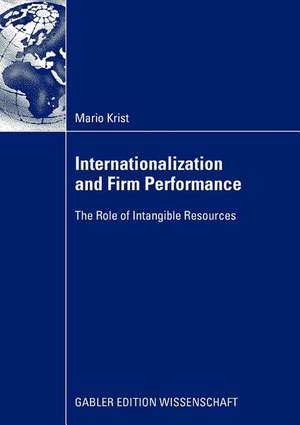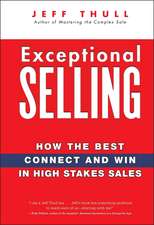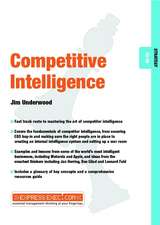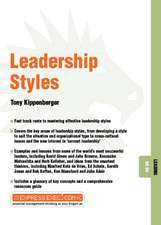Internationalization and Firm Performance: The Role of Intangible Resources
Autor Mario Kristen Limba Engleză Paperback – 25 iun 2009
Preț: 384.86 lei
Nou
Puncte Express: 577
Preț estimativ în valută:
73.66€ • 76.69$ • 62.25£
73.66€ • 76.69$ • 62.25£
Carte tipărită la comandă
Livrare economică 08-22 martie
Preluare comenzi: 021 569.72.76
Specificații
ISBN-13: 9783834915504
ISBN-10: 3834915505
Pagini: 263
Ilustrații: XIX, 263 p. 11 illus.
Dimensiuni: 148 x 210 x 18 mm
Greutate: 0.34 kg
Ediția:2009
Editura: Gabler Verlag
Colecția Gabler Verlag
Locul publicării:Wiesbaden, Germany
ISBN-10: 3834915505
Pagini: 263
Ilustrații: XIX, 263 p. 11 illus.
Dimensiuni: 148 x 210 x 18 mm
Greutate: 0.34 kg
Ediția:2009
Editura: Gabler Verlag
Colecția Gabler Verlag
Locul publicării:Wiesbaden, Germany
Public țintă
ResearchCuprins
The Effect of Context-Related Moderators on the Internationalization-Performance Relationship: Evidence from Meta-Analysis.- Intangible Resources and their Effect on the Internationalization-Performance Relationship.- Intangible Resources and the Internationalization Process: Path Dependence of Building a Profitable Multinational Company.- Conclusion.
Notă biografică
Dr. Mario Krist promovierte bei Prof. Dr. Andreas Bausch am Lehrstuhl für Strategisches Management und Controlling der Jacobs University Bremen. Er ist als Mitarbeiter im Strategischen Controlling der Bayer AG tätig.
Textul de pe ultima copertă
After thirty years of research on the relationship between internationalization and firm performance, findings on its direction and magnitude are still contradictory.
Mario Krist explores if, how, and why internationalization and performance are related to each other and explicitly considers the role of intangible resources in this context. Based on the method of meta-analysis, he reveals a positive relationship at the aggregate level which is moderated by contextual factors. Having found that a sigmoid curve type pattern best explains the relationship for a sample of German multinational firms, the author explores the moderating role of five different intangible resources. He suggests that the successful international deployment of intangible resources depends on whether the value of a resource is location bound or not. Furthermore, firm performance is not only influenced by the degree of internationalization but also by the way how it is implemented. Finally, he demonstrates that a slow and modest pace of international expansion has a positive impact on performance, whereas this effect can eventually turn negative for firms progressing too quickly.
Mario Krist explores if, how, and why internationalization and performance are related to each other and explicitly considers the role of intangible resources in this context. Based on the method of meta-analysis, he reveals a positive relationship at the aggregate level which is moderated by contextual factors. Having found that a sigmoid curve type pattern best explains the relationship for a sample of German multinational firms, the author explores the moderating role of five different intangible resources. He suggests that the successful international deployment of intangible resources depends on whether the value of a resource is location bound or not. Furthermore, firm performance is not only influenced by the degree of internationalization but also by the way how it is implemented. Finally, he demonstrates that a slow and modest pace of international expansion has a positive impact on performance, whereas this effect can eventually turn negative for firms progressing too quickly.












